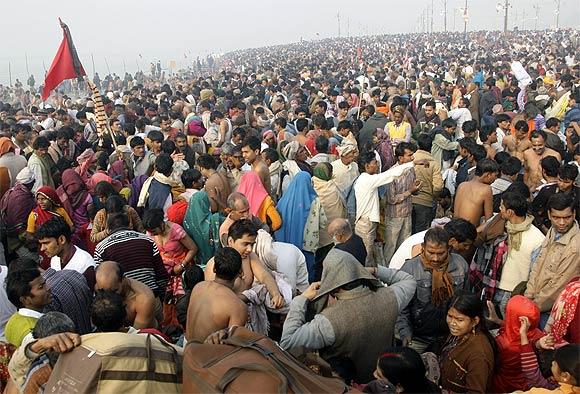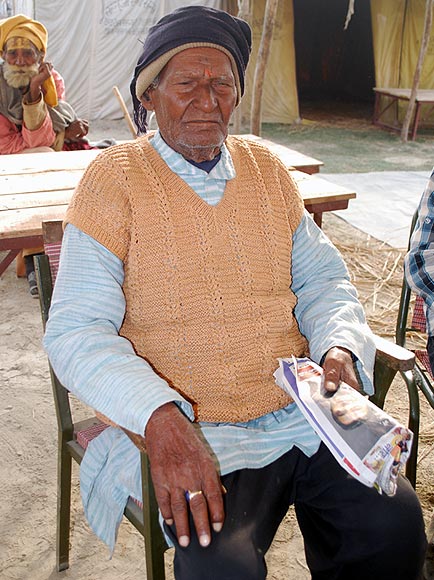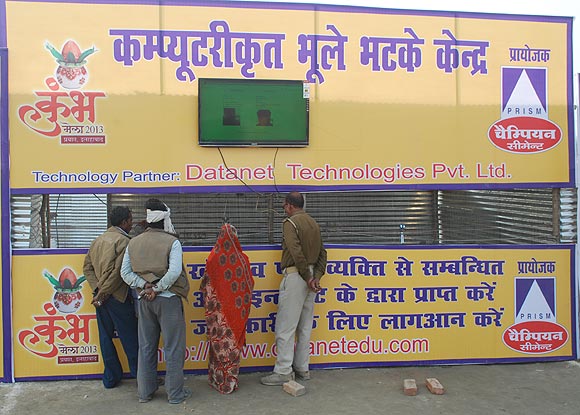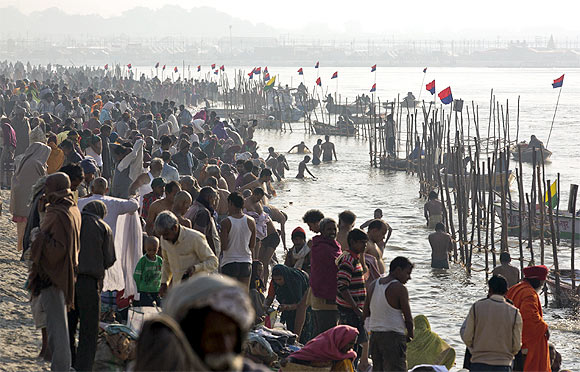
Raja Ram Tiwari has helped as many as ten lakh lost people find their family members in the confusion and clamour of such holy gatherings, says Sharat Pradhan
Many a twins in the world of Hindi films may have been separated in the melee of Kumbh Mela – the largest gathering of people on the planet.
Millions of the faithful and the curious gather at the bank of the Sangam -- the holy confluence of the Ganga and the Yamuna in Allahabad -- to take a dip in the holy waters to wash away their sins
During the British era, the colonial rulers did precious little to make the experience a less daunting one for the many people at Kumbh Mela. The Maha Kumbh, held once in 12 years, was infamous as a place where people got separated from their loved ones and eventually went missing.
In 1946, a 19-year-old took it upon himself to do something to bring an end to this infamy about the Kumbh Mela.
"It is true that people could get lost in the midst of such a huge crowd. I felt that it would be worthwhile to do something to reunite the lost people. At least it would help the Kumbh Mela to shed the tag of a place where people got separated," recalls Raja Ram Tiwari.
Click on NEXT for more...

He is 86 years old now but continues to pursue his mission doggedly.
Tiwari has helped as many as ten lakh lost people find their family members in the confusion and clamour of such holy gatherings.
Perched on a rickety wooden chair with a rusty desk, Tiwari shares this mind-boggling number with us.
"Most of them were from the six Maha Kumbhs and seven Ardh Kumbh melas. Some of them were also from the annual Magh melas," he said.
"I started with a few volunteers who joined me to form the Bharat Seva Dal, which now has nearly 150 members and is providing excellent service to society without seeking anything in return," he adds.
Asked about the changes he has witnessed over the years, he said, "Well, it is the sheer size of the event. Our country's population has grown so much. The number of people attending these melas has also continued to grow. But the logistics behind such gatherings has also changed."
Click on NEXT for more...

He adds, "During the initial years, when there was no electricity connection at the bank of the Sangam and battery operated microphones were rare and expensive, I used to go round the mela area with hand-held rustic loud-speakers, announcing the names and particulars of the people who would end up at our 'lost and found persons' camp. That was no mean task as it involved walking miles and miles every day. But our labour bore fruit as we were successful in reuniting many lost ones with their family members."
He continued, "The difference in the magnitude of the mela can be assessed by the statistics. In the 1954 Maha Kumbh, 3,529 men and women and 152 children got lost. In the last Maha Kumbh in 2001, over one lakh people reported at our camp. I am sure the figure will be higher this time."
And what happens to those who family members cannot be traced?
"Well, we keep them at this camp where we have the basic necessary amenities. Repeated announcements, which go on round the clock, do work. Sometimes it takes two to four days (to find their family members). In case the waiting period is longer, we send them to a local philanthropic ashram," he says.
Click on NEXT for more...

Those who are in a position to find their own way home are provided with a ticket, food and a small amount of money to reach their homes, he added.
The octogenarian recalls one particularly difficult case.
"During the last Kumbh Mela, a dumb and partially deaf woman, in her mid-thirties, ended up in our camp. She could not read or write. There was no trace of her family for nine days. On the tenth day, we noticed that she was repeatedly pointing towards a green tree in the neighbourhood. I promptly asked her if her husband's name was Hari and she nodded," he says.
"One by one, I added all the possible suffixes to Hari. When I mentioned 'Hari Shankar', she affirmed that name with a wide exclamation. That made our task easier. The following day, in a chance interaction with someone from her village, I mentioned the missing woman's case and the name of her husband. Within the next 24 hours, he brought the poor woman's husband. I can't tell you what a delight it was for all of us (to see them united), just as it as for the two of them," he says.
Tiwari, who wonders if he would be there to witness the next Maha Kumbh in 2125, is glad to have a son who is ready to carry on his father's legacy.
"I have assisted my father all these years. I would be only too happy to fulfill his dream of carrying the mission forward," said his son Umesh Chandra Tiwari.
Click on NEXT for more...
...